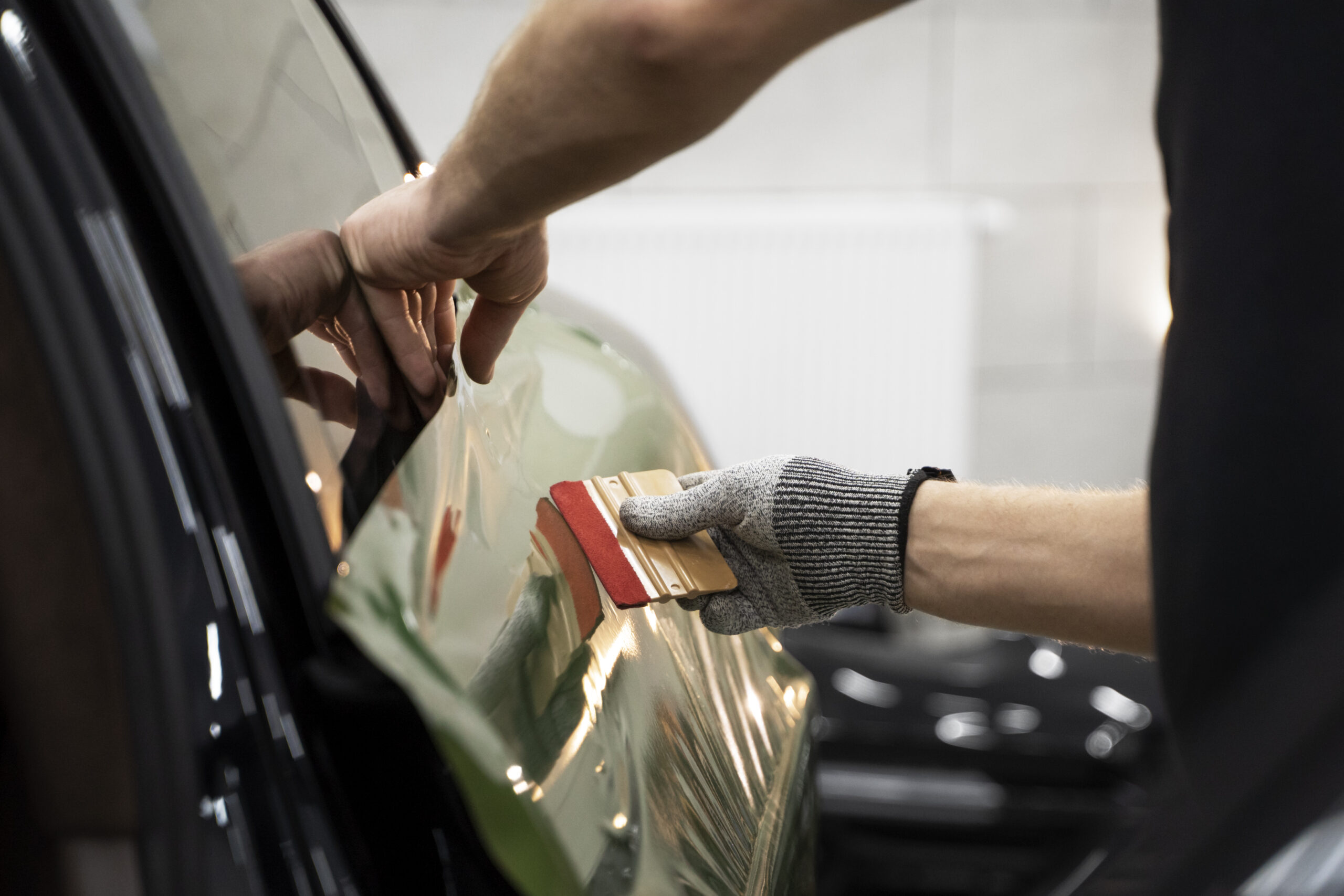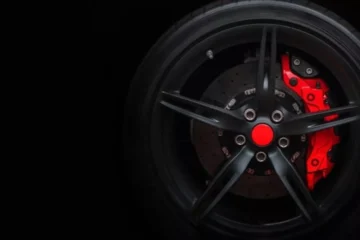When you invest in a car, you want to keep it looking as pristine as the day you drove it off the lot. Whether you have a luxury vehicle, a sports car, or a family sedan, the aesthetic appeal of your car is something you value. That’s where Paint Protection Film (PPF) comes into play. Commonly referred to as PPF car protection, this transparent, durable film shields your vehicle’s paint from everyday hazards, ensuring that it maintains its showroom shine for years to come.
What is Paint Protection Film?
Paint Protection Film is a thermoplastic urethane film that is applied to the painted surfaces of a vehicle. Originally developed by the military to protect helicopter blades from debris, this technology has been adapted for automotive use to protect car paint from chips, scratches, stains, and other types of damage. PPF is commonly applied to the most vulnerable areas of a car, such as the front bumper, hood, side mirrors, and fenders, although it can be applied to the entire vehicle for maximum protection.
Why Do You Need PPF for Your Car?
The road is full of potential hazards that can damage your car’s paint, from small stones and gravel to road debris and even insects. Over time, these minor impacts can lead to unsightly chips and scratches that mar your car’s appearance. Furthermore, exposure to UV rays can cause the paint to fade, while chemicals such as bird droppings, tree sap, and road salts can leave permanent stains. PPF acts as a barrier between your car’s paint and these damaging elements, preserving the integrity and appearance of your vehicle.
The Benefits of PPF Car ProtectionInvisible Protection: One of the most significant advantages of PPF is its transparency. Once applied, it’s virtually invisible, so it won’t alter the appearance of your vehicle. Your car retains its original color and finish while gaining a robust layer of protection.
Self-Healing Properties: Modern PPF products come with self-healing properties. This means that minor scratches and swirl marks can disappear on their own when the film is exposed to heat, either from the sun or a heat gun. This feature ensures that your car always looks its best without frequent maintenance.
UV Resistance: PPF offers protection against the sun’s ultraviolet (UV) rays, which can cause paint to oxidize and fade over time. With PPF, your car’s paint will retain its vibrant color and glossy finish, even after years of exposure to the sun.
Chemical Resistance: Everyday contaminants like bird droppings, tree sap, bug splatter, and road salts can wreak havoc on your car’s paint. PPF is highly resistant to chemicals, preventing these substances from etching or staining your paint.
Ease of Maintenance: Cars with PPF are easier to clean and maintain. The film’s hydrophobic properties cause water, dirt, and grime to bead up and roll off, making it easier to wash your car and keeping it looking clean for longer periods.
Increased Resale Value: A well-maintained exterior can significantly boost your car’s resale value. PPF helps preserve the paint in like-new condition, which can make your vehicle more attractive to potential buyers when it’s time to sell.
Types of Paint Protection FilmThere are various types of PPF available, each with its own set of characteristics. Understanding these differences can help you choose the right film for your vehicle.Glossy Finish PPF: This type of film enhances the natural shine of your car’s paint. It’s ideal for those who want to maintain a high-gloss, polished appearance.
Matte Finish PPF: For a more unique look, matte finish PPF provides a satin or matte effect, transforming the appearance of your vehicle. It’s a popular choice for luxury and sports cars that want to stand out from the crowd.
Textured PPF: Some PPFs come with a textured surface that mimics carbon fiber or other materials. This type of film is often used for accents or specific areas of the car to create a customized look.
Pre-Cut Kits: Pre-cut PPF kits are designed specifically for your make and model, ensuring a perfect fit without the need for trimming or customization during installation.
Bulk Rolls: For those who prefer a custom installation, bulk rolls of PPF allow for precise cutting and fitting to any part of the car. This option is often used by professionals who offer bespoke protection solutions.How is PPF Applied?The application of PPF is a meticulous process that requires a high level of skill and precision. It’s highly recommended to have it installed by a professional to ensure the best results. Here’s a step-by-step overview of the installation process:
- Preparation: The car is thoroughly cleaned to remove any dirt, dust, or contaminants that could interfere with the adhesion of the film. Any existing wax or sealants are also removed.
- Custom Cutting: Depending on the type of PPF being used, the film is either pre-cut using a plotter or custom cut by hand to fit the specific contours of the vehicle.
- Application: A slip solution (usually a mixture of water and soap) is sprayed onto the car’s surface and the adhesive side of the film. This allows the installer to position the film accurately before squeegeeing out the solution to adhere the film to the paint.
- Smoothing: The installer uses a squeegee to smooth out the film, removing any air bubbles and excess solution. The film is then carefully stretched and adjusted to fit the curves and edges of the car.
- Final Inspection: After the film is applied, the installer checks for any imperfections, such as trapped air or dust, and corrects them. The car is then left to cure, allowing the adhesive to bond fully to the paint. Maintenance Tips for PPFWhile PPF is incredibly durable, it still requires some care to ensure it lasts as long as possible. Here are a few maintenance tips:
- Regular Washing: Wash your car regularly to remove dirt and grime that can build up on the surface of the film. Use a mild soap and a soft cloth or sponge to avoid scratching the film.
- Avoid Harsh Chemicals: When cleaning your car, avoid using abrasive cleaners or harsh chemicals that could damage the film. Stick to pH-neutral products that are safe for use on PPF.
- Protective Waxing: While PPF is hydrophobic, applying a layer of wax or sealant specifically designed for PPF can provide additional protection and enhance the film’s shine.
- Be Mindful of Pressure Washing: If you use a pressure washer, maintain a safe distance and avoid directing the high-pressure stream directly at the edges of the film, as this could lift or damage it.
Inspect for Damage:
- Periodically inspect the PPF for any signs of damage or wear. If you notice any issues, such as peeling or discoloration, consult a professional to address the problem before it worsens.
How Long Does PPF Last?
- The lifespan of Paint Protection Film can vary depending on factors such as the quality of the film, the installation process, and how well the film is maintained. On average, high-quality PPF can last between 5 to 10 years. Some premium films come with warranties that cover discoloration, peeling, and other defects, offering peace of mind to car owners.
The Cost of PPF Car Protection
- The cost of PPF varies based on the size of the area being covered, the type of film used, and the complexity of the installation. A full car wrap can be quite expensive, ranging from a few thousand to several thousand dollars, but many car owners find the investment worthwhile given the long-term protection it offers. For those on a budget, applying PPF to high-impact areas such as the front bumper, hood, and side mirrors can provide significant protection at a lower cost.
Is PPF Worth It?
If you’re someone who cares deeply about the appearance of your vehicle, PPF is definitely worth considering. Not only does it protect your car’s paint from everyday wear and tear, but it also helps maintain its value over time. Whether you plan to keep your car for years or eventually sell it, PPF ensures that it remains in top condition, making it a smart investment for any car owner.
Conclusion
Paint Protection Film offers an unparalleled level of protection for your car’s paint, helping to preserve its beauty and value for years to come. With its invisible, self-healing properties and resistance to UV rays and chemicals, PPF is an excellent choice for anyone looking to protect their vehicle from the rigors of the road. Whether you opt for a full wrap or just cover the most vulnerable areas, PPF car protection is an investment that pays off in the long run, keeping your car looking as good as new.
Stay in touch to get more updates & news on Gossips!



